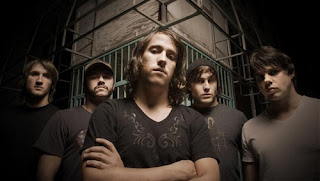About Saosin

Southern California quintet Saosin are one of the fastest-growing headliners in rock – earning mainstage slots on the Vans Warped Tour, selling out clubs in a flash, going out with heavyweights like AFI, Avenged Sevenfold, My Chemical Romance and Taking Back Sunday and garnering an ocean of fans who’ve downloaded their songs from MySpace over five million times – all before they’ve released a full-length album.
That will all change on September 26th with the Capitol Records release of their self-titled debut. As your average Saosin fan (and there are legions) will be quick to point out, the wait was a considerable one. “We were waiting until the songs were right,” says frontman Cove Reber with some understatement.
It’s been three years since word of the band’s full-length debut first surfaced, and in that time a lot has changed within the music scene from which they originally emerged and within the band itself.
Seemingly overnight, stylized bands playing strains of melodic post-hardcore have sailed up the pop charts. But for Saosin -- Reber, bassist Chris Sorenson, drummer Alex Rodriguez, and guitarists Beau Burchell and Justin Shekoski -- things have played out a bit differently. During the scene’s ascension, the band’s members have all but shunned the idea of a genre tag or an “image” -- unless, of course, you count the jeans and t-shirts they soak in sweat every night onstage -- and have instead focused their energies on making an album that will live or die strictly on musical merits.
“At first we said we weren’t interested in putting the album out on a major label,” says Burchell. “We wanted to grow first.”
But the band’s sound and its ambition grew tremendously during the recording of their 12-song debut, an album that exceeds even the wildest of expectations. From the dueling guitar crunch of opener “It’s Far Better to Learn” to the nosebleed anthemic heights of lead single “Voices,” the livewire maelstrom of “Follow and Feel” and epic heartstring-puller “You’re Not Alone,” Saosin have created the kind of debut album that announces something indisputably new under rock’s sun.
“It was a long time coming,” says Sorenson, “but finishing the album really put a fire under our asses and we were better for it.”
The initial stages of the band’s debut date back to late 2003 when founding guitarists Burchell and Shekoski and original frontman Anthony Green began playing out, recorded a quick EP, Translating the Name, and embarked on a U.S. tour during which time Green exited the band. To the group’s surprise Translating the Name garnered the band a massive fanbase both online and at their live shows, which grew organically, and quickly.
The band, however, was so hands-off about promoting themselves that Google searches of the band turned up precious little info.
“It was cool if you knew about the band, we weren’t always easy to find,” says Burchell. “But I think that really brought kids together, having to actually make the effort to track us down.”
A collection of rabid fans with Ethernet connections soon began arguing about such pressing matters as how the band’s name was actually pronounced (it’s “say-o-sin”) and what it actually means (Saosin means “small heart” in Chinese. The word comes from a 15th century proverb about fathers telling their sons who are being married off for money not to get emotionally involved with their wives, who could die at any time.)
In the winter of 2005 the revamped Saosin lineup with Sorenson, Rodriguez and new frontman Reber signed to Capitol, released a self-titled EP of demos and live tracks, and began pre-production on their long-awaited full-length debut. As the band recorded various versions of their new songs -- both at their home studios and on a mobile recording unit that they set up on their tour bus – the burden of heavy expectations eventually gave way to genuine excitement.
“I would demo stuff with Chris,” Reber recalls, “and say, ‘This is really good – we can’t not run with this.’”
In turn, the album that Saosin began recording with producer Howard Benson (My Chemical Romance, Head Automatica) this past January -- nearly a full year after they began properly demoing its songs -- would live up to the band’s great expectations, and then some. More importantly, though, it proves that in a world of overnight success at least one group is devoted enough to write songs that are built to last.
“This record is going to take us places,” says Sorenson. “We don’t know exactly where, but it will definitely be an experience getting there.”
That will all change on September 26th with the Capitol Records release of their self-titled debut. As your average Saosin fan (and there are legions) will be quick to point out, the wait was a considerable one. “We were waiting until the songs were right,” says frontman Cove Reber with some understatement.
It’s been three years since word of the band’s full-length debut first surfaced, and in that time a lot has changed within the music scene from which they originally emerged and within the band itself.
Seemingly overnight, stylized bands playing strains of melodic post-hardcore have sailed up the pop charts. But for Saosin -- Reber, bassist Chris Sorenson, drummer Alex Rodriguez, and guitarists Beau Burchell and Justin Shekoski -- things have played out a bit differently. During the scene’s ascension, the band’s members have all but shunned the idea of a genre tag or an “image” -- unless, of course, you count the jeans and t-shirts they soak in sweat every night onstage -- and have instead focused their energies on making an album that will live or die strictly on musical merits.
“At first we said we weren’t interested in putting the album out on a major label,” says Burchell. “We wanted to grow first.”
But the band’s sound and its ambition grew tremendously during the recording of their 12-song debut, an album that exceeds even the wildest of expectations. From the dueling guitar crunch of opener “It’s Far Better to Learn” to the nosebleed anthemic heights of lead single “Voices,” the livewire maelstrom of “Follow and Feel” and epic heartstring-puller “You’re Not Alone,” Saosin have created the kind of debut album that announces something indisputably new under rock’s sun.
“It was a long time coming,” says Sorenson, “but finishing the album really put a fire under our asses and we were better for it.”
The initial stages of the band’s debut date back to late 2003 when founding guitarists Burchell and Shekoski and original frontman Anthony Green began playing out, recorded a quick EP, Translating the Name, and embarked on a U.S. tour during which time Green exited the band. To the group’s surprise Translating the Name garnered the band a massive fanbase both online and at their live shows, which grew organically, and quickly.
The band, however, was so hands-off about promoting themselves that Google searches of the band turned up precious little info.
“It was cool if you knew about the band, we weren’t always easy to find,” says Burchell. “But I think that really brought kids together, having to actually make the effort to track us down.”
A collection of rabid fans with Ethernet connections soon began arguing about such pressing matters as how the band’s name was actually pronounced (it’s “say-o-sin”) and what it actually means (Saosin means “small heart” in Chinese. The word comes from a 15th century proverb about fathers telling their sons who are being married off for money not to get emotionally involved with their wives, who could die at any time.)
In the winter of 2005 the revamped Saosin lineup with Sorenson, Rodriguez and new frontman Reber signed to Capitol, released a self-titled EP of demos and live tracks, and began pre-production on their long-awaited full-length debut. As the band recorded various versions of their new songs -- both at their home studios and on a mobile recording unit that they set up on their tour bus – the burden of heavy expectations eventually gave way to genuine excitement.
“I would demo stuff with Chris,” Reber recalls, “and say, ‘This is really good – we can’t not run with this.’”
In turn, the album that Saosin began recording with producer Howard Benson (My Chemical Romance, Head Automatica) this past January -- nearly a full year after they began properly demoing its songs -- would live up to the band’s great expectations, and then some. More importantly, though, it proves that in a world of overnight success at least one group is devoted enough to write songs that are built to last.
“This record is going to take us places,” says Sorenson. “We don’t know exactly where, but it will definitely be an experience getting there.”
inspiration : here


Komentar